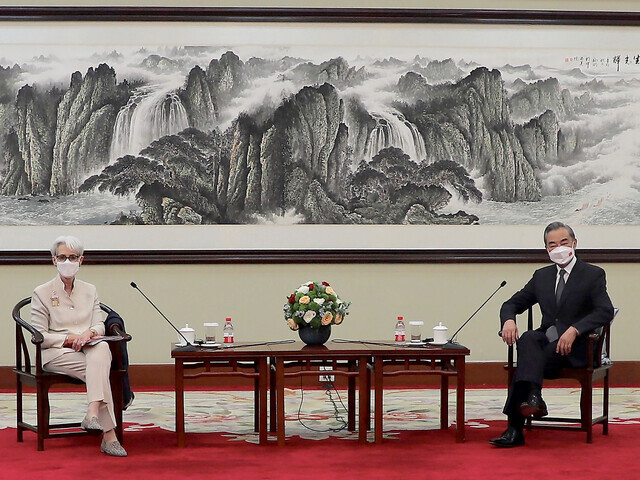hankyoreh
Links to other country sites 다른 나라 사이트 링크
[Column] Why are Xing Haiming, Kim Yo-jong doubling down on attacking S. Korea-US alliance?

As expected, former Prosecutor General and presidential contender Yoon Seok-youl played a dangerous game with his attitudes on South Korea's foreign affairs and national security.
In an interview with the JoongAng Ilbo newspaper on July 15, he insisted that China "should first withdraw the long-range radar positioned near its borders if it intends to call for [South Korea's] withdrawal of the THAAD deployment."
This was inconsistent with the official position of the South Korean government, which maintains that US Forces Korea's deployment of THAAD is meant to defend against North Korean missiles and has nothing to do with China. Beyond that, though, it was an irresponsible remark that stands to jeopardize relations between Seoul and Beijing.
An unexpected twist was the response from Chinese Ambassador to South Korea Xing Haiming. The following day, he published a rebuttal of Yoon's interview remarks under the title "China-South Korea relations are not an accessory to South Korea-US relations."
Criticisms began to spread over China's "overt election interference," with Xing denounced as a "21st century Yuan Shikai."
As a professional diplomat well versed in South Korea's situation, why would Xing invite that sort of condemnation upon himself? The reason lies in a transformation in China's diplomatic approach toward a "wolf warrior" style, which involves applying heavy pressure on the other side to get it to capitulate.
There's been a clear shift toward an approach where President Xi Jinping and a select few key associates make decisions on important matters, after which diplomats go on a forceful, coordinated attack on other parties seen as going against China's course and interests — drawing cheers from the patriotic public back home. Xing's contribution showed that "wolf warrior diplomacy" is now a variable in South Korea-China relations too.
Seoul's diplomatic efforts have also been complicated by the duel between the US, which is looking to hem China in more firmly, and China, which is seeking to unsettle US alliances.
Back in 1971 and 1972, a China visit by Henry Kissinger and then-US President Richard Nixon resulted in a tacit compromise between the two sides when it came to their respective spheres of influence and territorial issues. Today, both sides are battling to undermine the "post-Cold War consensus" reached 50 years ago.
Shows of force concerning Taiwan have been at a level that has many talking about the specter of war. Feuding over the regions of Xinjiang and Tibet in western China has reached more and more dangerous proportions.
On July 21 to 23, Xi visited Tibet to show off how thoroughly the Chinese Communist Party was controlling the region. On July 28, US Secretary of State Antony Blinken visited India and met with the representative of the Tibetan government in exile.
The same day, Chinese Foreign Minister Wang Yi invited a delegation from Afghanistan's Taliban to show how firmly China supports the Islamist organization as Afghanistan emerges as a key variable in the Xinjiang situation.
On July 27, Chinese Foreign Ministry spokesperson Zhao Lijian signaled China's support for Russia in its dispute with Japan surrounding the four islands of the "Northern Territories," stating that it was "China's consistent belief that the outcomes of the victorious Anti-Fascist War [World War II] should be earnestly respected and upheld."
It was in this context that Workers' Party of Korea Deputy Director Kim Yo-jong issued a statement on Aug. 1 warning that South Korea-US joint military exercises would be an "undesirable prelude" that "further beclouds the way ahead of the north-south relations."
Wang Yi sounded a similar note on Friday, stressing that the South Korea-US joint military exercises were "not constructive under the current situation" and that the US "should not engage in any activities that create tensions if it truly wishes to restore dialogue with North Korea."
As the exercises began on Tuesday, Kim Yo-jong released another statement expressing "deep regret at the perfidious behavior of the south Korean authorities."
Calling for the withdrawal of USFK, she said, "As long as the U.S. forces stay in south Korea, the root cause for the periodic aggravation of the situation on the Korean peninsula will never vanish."
If North Korea really wanted the exercises postponed, Kim's statement would seem to make little sense, as it could only be expected to backfire. This sort of behavior — using a statement to apply pressure on a matter that ought to be addressed through inter-Korean and North Korea-US talks — would only lead to a stronger outcry from the South Korean public, narrowing the opinions for the South Korean government as it works to improve inter-Korean relations and resume North Korea-US talks.
If anything, there is ample room for reading it as North Korea's attempt to work with China to drive a wedge in the South Korea-US alliance as Beijing seeks to weaken Washington's efforts to contain it. We can expect to see more and more of this kind of coordinated behavior between North Korea and China as tensions rise in US-China relations.
In this context, the tactics adopted by South Korean conservatives in the wake of Kim's statement — raising questions about the "orders" behind it, or having 74 opposition lawmakers issue a statement on the postponement of the South Korea-US exercises — are an unfortunate development that serves only to heighten domestic discord over security issues.
What we need right now is to confront this situation, where the heated geopolitics of the US-China feud is having a profound impact on the Korean Peninsula, and to develop a long-term strategy to create the best path to peace, coexistence and prosperity without the peninsula becoming the front lines of the "new Cold War."
The presidential election should be an occasion for figuring out who is the optimal candidate — the one who has puzzled over and studied this path the most.

By Park Min-hee, editorial writer
Please direct comments or questions to [english@hani.co.kr]

Editorial・opinion
![[Column] Park Geun-hye déjà vu in Yoon Suk-yeol [Column] Park Geun-hye déjà vu in Yoon Suk-yeol](https://flexible.img.hani.co.kr/flexible/normal/500/300/imgdb/original/2024/0424/651713945113788.jpg) [Column] Park Geun-hye déjà vu in Yoon Suk-yeol
[Column] Park Geun-hye déjà vu in Yoon Suk-yeol![[Editorial] New weight of N. Korea’s nuclear threats makes dialogue all the more urgent [Editorial] New weight of N. Korea’s nuclear threats makes dialogue all the more urgent](https://flexible.img.hani.co.kr/flexible/normal/500/300/imgdb/original/2024/0424/7317139454662664.jpg) [Editorial] New weight of N. Korea’s nuclear threats makes dialogue all the more urgent
[Editorial] New weight of N. Korea’s nuclear threats makes dialogue all the more urgent- [Guest essay] The real reason Korea’s new right wants to dub Rhee a founding father
- [Column] ‘Choson’: Is it time we start referring to N. Korea in its own terms?
- [Editorial] Japan’s rewriting of history with Korea has gone too far
- [Column] The president’s questionable capacity for dialogue
- [Column] Are chaebol firms just pizza pies for families to divvy up as they please?
- [Column] Has Korea, too, crossed the Rubicon on China?
- [Correspondent’s column] In Japan’s alliance with US, echoes of its past alliances with UK
- [Editorial] Does Yoon think the Korean public is wrong?
Most viewed articles
- 1‘We must say no’: Seoul defense chief on Korean, USFK involvement in hypothetical Taiwan crisis
- 2N. Korean delegation’s trip to Iran shows how Pyongyang is leveraging ties with Moscow
- 3‘Weddingflation’ breaks the bank for Korean couples-to-be
- 4[Column] Park Geun-hye déjà vu in Yoon Suk-yeol
- 5Korea sees more deaths than births for 52nd consecutive month in February
- 6[Guest essay] The real reason Korea’s new right wants to dub Rhee a founding father
- 7[Column] The clock is ticking for Korea’s first lady
- 8[Column] Has Korea, too, crossed the Rubicon on China?
- 9Why Korea shouldn’t welcome Japan’s newly beefed up defense cooperation with US
- 10Will NewJeans end up collateral damage in internal feud at K-pop juggernaut Hybe?